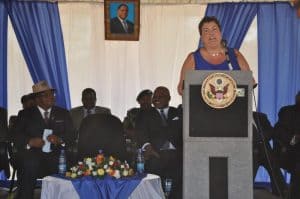Feed the Future Malawi Improved Seed Systems and Technologies project launched
17 May 2015
The Feed the Future Malawi Improved Seed Systems and Technologies project which is being implemented by a consortium of four CGIAR centers was launched, alongside other USAID-funded projects, in a colorful ceremony held on 6 May in Liwonde, Machinga district.

In attendance during the event were senior officials from Government, the private sector, representatives of beneficiary communities, implementing partners, USAID/Malawi, and the guest of honor, the US Ambassador to Malawi,Virginia Palmer.
In her speech, Ambassador Palmer said the launching of the projects represent a core pillar of the US Government’s plans for advancing sustainable economic growth in Malawi over the next five years.
She acknowledged the problems Malawi is currently facing, such as shortage of improved seeds, malnutrition, widespread deforestation, and dwindling fish reserves.
The projects have been designed to bring solutions to these challenges and make the country food secure.
“Despite the scale of the challenge, the conditions necessary for meaningful progress are clearly taking shape…” she said. “All the projects we are launching today were designed to reinforce one another. This integration is the hallmark of USAID development projects in Malawi and may soon become a model for development worldwide.”
The Government of Malawi said the event came at an opportune time as it was working to address issues of sustainable crop production and food security in the face of persistent droughts and floods.
“I applaud the US Government, through the USAID, for supporting the multiplication and distribution of high quality seeds, not just for the traditional maize crop but also for those usually neglected: soybean, pigeon pea, groundnut, and orange fleshed sweetpotato,” said Dr Allan Chiyambekeza, the Minister of Agriculture, Irrigation and Water Development.
Dr Chiyembekeza bemoaned the shortage of certified seeds on the market despite the fact that high yielding, disease resistant, and drought-tolerant varieties had been developed and were available at research centers.
“The challenge is getting the seeds to the farmers,” he said. “Consequently, the use of improved seeds, especially for the non-traditional crops, is still very low among our smallholder farmers.”
Speaking with the media afterwards Dr Arega Alene, IITA Malawi Country Representative, said that IITA was using the public-private partnership approach (PPP) to ensure that smallholder farmers in the target districts gained access to improved seeds of high yielding and early maturing varieties of soybean such as Tikolore (TGx 1740-2F).”
Dr Alene explained, “We have a seed road map which we are putting into action through the PPP approach and this represents a departure from the way we used to do things in the past. We have brought on board the private sector and community-based organizations and farmers’ groups in an effort to enhance the dissemination and adoption of these improved technologies.” He added, “This project will allow us to reach a large number of farmers with improved seeds and agronomical practices. This will help us to bridge the yield gap, increase farm incomes, and move people out of poverty.” The project consists of four CGIAR centers: IITA, ICRISAT, CIP, and CIMMYT. The main areas of focus for the consortium in the seven target districts in central and southern Malawi are (1) Biological control of aflatoxin in maize and groundnut; (2) Multiplication and distribution of seeds of improved varieties of maize, groundnut, pigeon pea, soybean, and sweetpotato; and (3) Demonstration of improved varieties and complementary agronomic practices to create technology awareness, dem and, and adoption by farmers.
For more information:
Andrea Gros, Head of Communication, IITA HQ, a.gros@cgiar.org
About IITA, www.iita.org
IITA is one of the world’s leading research partners in finding solutions for hunger, malnutrition, and poverty. Its award-winning research for development (R4D) approach addresses the development needs of tropical countries. IITA works with partners to enhance crop quality and productivity, reduce producer and consumer risks, and generate wealth from agriculture. IITA is a nonprofit organization founded in 1967 and governed by a Board of Trustees. IITA works on the following crops: cowpea, soybean, banana/plantain, yam, cassava, and maize. IITA is a member of CGIAR, a global agriculture research partnership for a food secure future.

